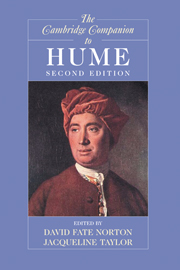Book contents
- Frontmatter
- 1 An Introduction to Hume’s Thought
- 2 Hume’s New Science of the Mind
- 3 Hume and the Mechanics of Mind: Impressions, Ideas, and Association
- 4 Hume’s Theory of Space and Time in Its Skeptical Context
- 5 Hume on Causation
- 6 Hume and the Problem of Personal Identity
- 7 Hume’s Skepticism
- 8 Hume’s Moral Psychology
- 9 The Foundations of Morality in Hume’s Treatise
- 10 Hume’s Later Moral Philosophy
- 11 The Structure of Hume’s Political Theory
- 12 Hume’s Principles of Political Economy
- 13 Hume on the Arts and “The Standard of Taste”: Texts and Contexts
- 14 David Hume: “The Historian”
- 15 Hume on Religion
- Appendix: Hume’s Autobiographies
- Selected Bibliography
- Index
- Series List
1 - An Introduction to Hume’s Thought
Published online by Cambridge University Press: 28 May 2009
- Frontmatter
- 1 An Introduction to Hume’s Thought
- 2 Hume’s New Science of the Mind
- 3 Hume and the Mechanics of Mind: Impressions, Ideas, and Association
- 4 Hume’s Theory of Space and Time in Its Skeptical Context
- 5 Hume on Causation
- 6 Hume and the Problem of Personal Identity
- 7 Hume’s Skepticism
- 8 Hume’s Moral Psychology
- 9 The Foundations of Morality in Hume’s Treatise
- 10 Hume’s Later Moral Philosophy
- 11 The Structure of Hume’s Political Theory
- 12 Hume’s Principles of Political Economy
- 13 Hume on the Arts and “The Standard of Taste”: Texts and Contexts
- 14 David Hume: “The Historian”
- 15 Hume on Religion
- Appendix: Hume’s Autobiographies
- Selected Bibliography
- Index
- Series List
Summary
Much of what David Hume said about a wide range of subjects remains of great importance today. In the first volume of his first work, A Treatise of Human Nature, a work in which he articulated a new “science of human nature,” Hume focused on an interrelated set of issues in theory of knowledge, metaphysics, and philosophical psychology. More particularly, he explained how it is that we form such important conceptions as space and time, cause and effect, external objects, and personal identity. At the same time, he offered an equally important account of how or why we believe in the objects of these conceptions - an account of why we believe that causes are necessarily connected to effects, that there are enduring external objects, and that there are enduring selves - even though the human mind is unable to provide a satisfactory proof that these phenomena exist. In the second volume of the Treatise Hume expanded his account of human psychology, focusing on the origin and role of the passions and the nature of human freedom. In the third and final volume of this work he explored the origins and nature of morality. In later works he returned to many of these philosophical issues, but he also made substantial contributions to our understanding of political theory, aesthetics, economics, and philosophy of religion. In addition, he wrote an influential, six-volume History of England, a work published in over 175 editions in the eighteenth and nineteenth centuries, and still in print.
- Type
- Chapter
- Information
- The Cambridge Companion to Hume , pp. 1 - 39Publisher: Cambridge University PressPrint publication year: 2008
- 3
- Cited by

